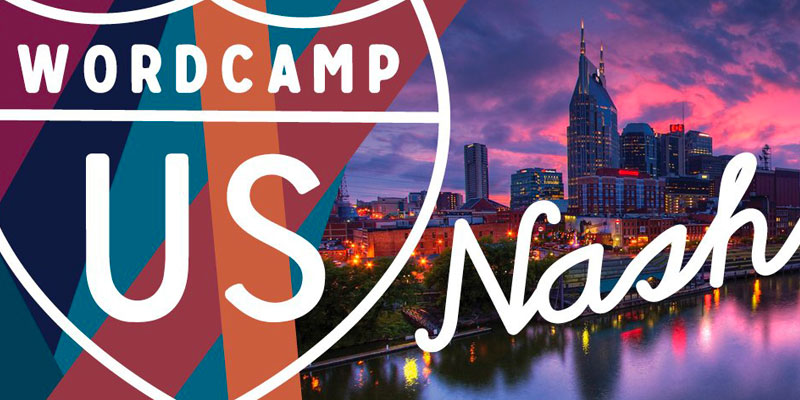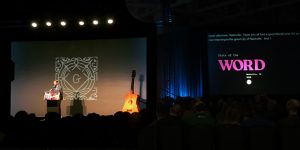Written by Beth Downey
For the second year I attended WordCamp US in my home city of Nashville, TN. Wordcamp US is the Western Hemisphere’s WordPress conference, a companion to Wordcamp Europe. The event consists of two days of sessions, loads of networking, several after-parties, the annual Contributor Day and the Annual “State of the Word” by Matt Mullenweg, co-founder of WordPress.
There were several highlights of this year’s conference. Chris Coyier‘s talk “Thinking Like a Front End Developer” gave me and others much to think about and consider. I learned much of what I know about CSS from Chris’ CSS Tricks so I was stoked to sit in on his talk. Later, in the hallway, I got the chance to say a word of thanks to him personally – i.e. “I’ve often said ‘I owe that guy so many beers!'” – as I’ve always found his online resources valuable because they’re written for real people, rather than tech speak. An eagerly anticipated session was “Moving the Web Forward with WordPress” by Morten Rand-Hendricksen who can always be counted on for a conversation to spark debate and lively discussions. He did not disappoint. As of Decmeber 2018, 32.5% of the web runs on WordPress and Rand-Hendricksen’s presentation centered on our responsibility as creators of websites to be “custodians of what we put on the web.” What got us here in 2018 won’t get us to the future and we need to manage ourselves better to achieve a better future. A three-pronged approach was discussed: Accesibility, Privacy and Open Governance. On the topic of “Governance,” the session closed with Rand-Hendricksen announcing “welcome to the 1st meeting of the WordPress Governance project” (more here).
Other notable talks included Helen Hou Sandi‘s “Metaboxes Considered Harmful” presentation which was more of a discussion of how to properly structure metabox/custom field content on the backend for ease of updating by our end users. And Joost De Valk and his wife Marieke, of Yoast fame, led a session titled “Thrive for the Future. The Business of Open Source.” The couple discussed the lessons learned from scaling a business from a solopreneur operation to what Yoast is today.
Other great talks included “Nobody Wants A Website. They Want Results!,” by Dwayne McDaniel a developer advocate and Pantheon engineer who discussed the importance of managing expectations and having measurable results, “WordPress As A Project Management Hub,” by Ryan King, Digital Experience Designer at the Smithsonian’s Freer|Sackler Museums of Asian Art who discussed the museum’s intranet built on WordPress, and “Building A Successful Code Review Culture” by Jonathan Derosiers, a WordPress developer at Bluehost, who ran his audience through the internal code review processes he’s found to be successful with his teams.
The buzz at Wordcamp US 2018 was Gutenberg, as WordPress 5.0 was released the day prior to the conference. Many talks focused on aspects of the shift in publishing, whether it be how to custom build blocks or what Gutenberg means to the future of WordPress. While I entered WCUS with a cautiously optimistic view of Gutenberg, I left the conference with excitement regarding the future of WordPress all due to gaining better understanding of how it will ease workflow, rather than be a stumbling block of potential damage to rout around.
Outside of the Music City Center, Friday night offered attendees networking with food, drinks and educational play at Nashville’s Adventure Science Center. Saturday night, the conference wrapped up with several after party events along Lower Broadway.
All in all, Nashville provided ample education and entertainment for Wordcamp US. And I know many of us are eagerly awaiting Wordcamp US 2019 in St Louis in November.






